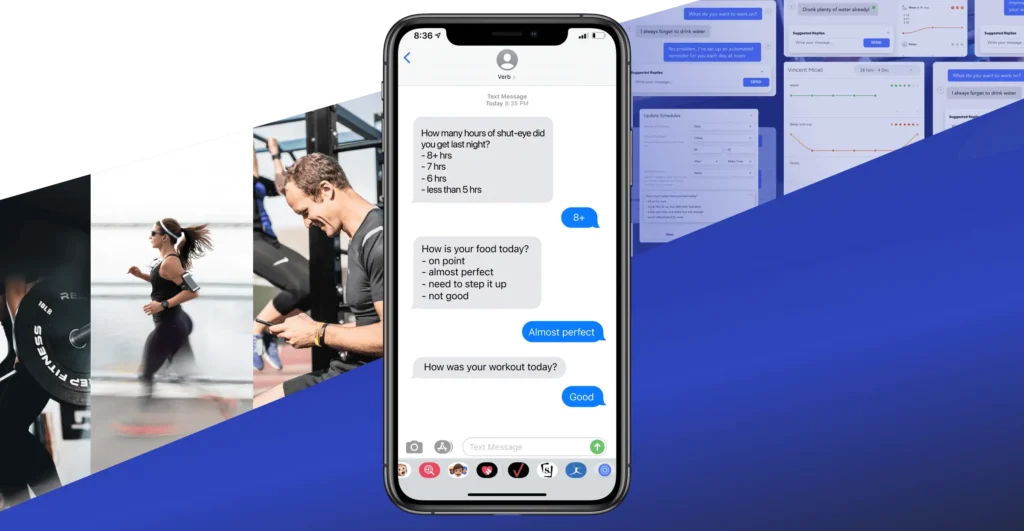How Verb Uses Text Messages To Transform The Way Gyms Retain Members

The intelligent SMS platform leverages AI to help gyms and personal trainers communicate more effectively with their customers
In a world of ever-more sophisticated communication methods, sometimes it’s the classics that work best, albeit with a modern twist.
Verb, an intelligent SMS and client management platform for fitness businesses, was created around the premise that text messages are the best way for gyms and personal trainers to meaningfully interact with their customers.
“We believe businesses should meet their clients where they’re at, and there’s no easier way to do that than text,” Vincent Miceli, co-founder and CEO of Verb, tells Athletech News. “Very rarely do you see people with hundreds of unread text messages, but nobody has notifications turned on for their apps anymore.”
According to Verb, its SMS messages have an open rate of 80%, a number that’s nothing to sneeze at in today’s world of constant notifications.
Verb takes things a step further than plain, old-fashioned texting, though, leveraging the transformative powers of AI to help gyms and personal trainers send smarter, more efficient and more personal texts to their customers. The platform offers intelligent reply suggestions, prioritizes which questions to answer and even analyzes messages for emotion.
A former banker and successful nightclub investor, Miceli started Verb in 2018 after he was inspired by his own success of losing over 100 pounds he had packed on after slipping into some bad nutrition and lifestyle habits.
Motivated by his personal weight loss journey, Miceli immersed himself in the fitness space, coaching thousands of clients on nutrition and opening several CrossFit gyms and boutique studios in New York. His original idea was to write a book about habits and sacrifice based on his client’s body transformations. While building out a platform to log the experiences of his clients for the eventual book, Miceli was encouraged to instead create a company that could put those experiences into product form.
Miceli partnered with entrepreneur and AI expert Artur Kiulian, Verb’s co-founder and current chief technology officer, to create the SMS platform.
Verb’s differentiator is its specialization. The platform focuses on a few core fitness and wellness habits and uses text messages to help people stick to them.
“Most of the wellness journey is doing a couple of simple and small things well,” Miceli says. “Most people think it’s these massive life changes, they think there’s some crazy workout, and that’s where they get it wrong. For the vast majority of the world, doing a few small things correctly and consistently is what really makes insane aesthetic and general health changes.”

Verb helps people make those small but impactful changes through texting. More precisely, it serves as an intermediary between gyms or personal trainers and their customers, allowing them to communicate better through texts.
“At its core, it’s a very simple product, which is just texting between a person or business offering a thing and the client who needs that thing offered,” Miceli says.
Verb sells its product directly to some individual personal trainers, although the company is primarily B2B2C, meaning it works with gyms and studios whose staff members or personal trainers use the platform to communicate with members via text. Verb’s clients include the likes of 24 Hour Fitness and Pure Barre.
Gyms and studios often come to Verb with some kind of member-engagement goal and leverage the platform to reach it.
For example, Miceli says that a gym may have identified that if it gets new members into the facility at least five times within the first month of joining, they’ll double their lifetime value to the business. Verb can make that happen by tapping into a gym’s client management system and sending the new members texts, such as asking them when they plan on coming into the gym next or if they intend to register for an upcoming class.
“We can easily influence attendance with a simple nudge,” Miceli says.
According to Verb, big box gyms using the platform saw between a 13% and 22% decrease in churn depending on whether they also leveraged Verb’s habit-tracking feature.

Verb’s offerings go deeper than simple attendance nudges. The platform allows personal trainers to scale their communications with clients through intelligent reply suggestions and question prioritization.
“We help personal trainers automate the required things for their program’s compliance, allowing them to spend a fraction of the time with an individual client,” Miceli explains. “On our platform, a person can typically handle about 200 conversations per hour.
Leveraging the power of AI, Verb has a unique feature it calls “sentiment and emotion tracking,” where the platform is able to pick out the dominant emotion a client is displaying in a text message. Verb currently tracks around 20 emotions, including joy, guilt, fear and happiness.
Understanding the emotion a client is displaying allows a personal trainer to communicate with their clients on a deeper, more personal level, driving engagement and ultimately, retention. It also helps trainers get better results for their clients since they can understand what’s motivating them to get in better shape in the first place.
“The emotion that breeds success is the only thing that matters in a goal,” Miceli says.
Verb also uses AI to predict when a gym’s members may churn. The platform’s model is more forward-looking than the churn models that are currently standard in the fitness industry, Miceli believes.
“Most churn models are based on past activities and spitting out a future outcome which is not that accurate,” he explains. “The unique part of our churn engine is that it’s happening in real-time. So if I talk to you for six months via text, I could spit out the month you will most likely stop buying my service based on your sentiment, based on how many texts you send and based on how many times you’re working out.”
The emotion-tracking and churn engine features are powerful examples of how AI is transforming the way fit tech companies like Verb can surface insights from data to help gyms and personal trainers.
Looking ahead, Miceli doesn’t see the rise of AI-powered Chatbots as a threat to Verb’s long-term viability. That’s because while platforms like ChatGPT and Bard might be good at giving the “textbook” answer to a general query, they’re of limited use for specific questions a client may have while on their fitness journey, the Verb co-founder believes.
Verb trains its AI model on hundreds of thousands, even millions, of specific, real-world conversations between clients and trainers. That level of fitness and wellness specialization likely can’t be matched by general AI tools.
Miceli shared a conversation he recently had with a VC investor, who believes that companies offering specialized products are well-positioned for success as AI evolves.
“This person believes that the second wave of artificial intelligence will be products like Verb, which are much smaller, more niched-down and can actually enhance the language models of these bigger ones in a way that allows them to be a completely vertically integrated SAAS platform,” Miceli says. “That means we can utilize the Bards and the ChatGPTs and enhance their delivery through our medium of communication in the wellness space.”
That investor confidence should bode well for Verb – the fit tech company, which has been bootstrapped to date, is actively looking to raise funds.
“We believe this is the beginning of what will potentially become a massive market opportunity,” Miceli says.



